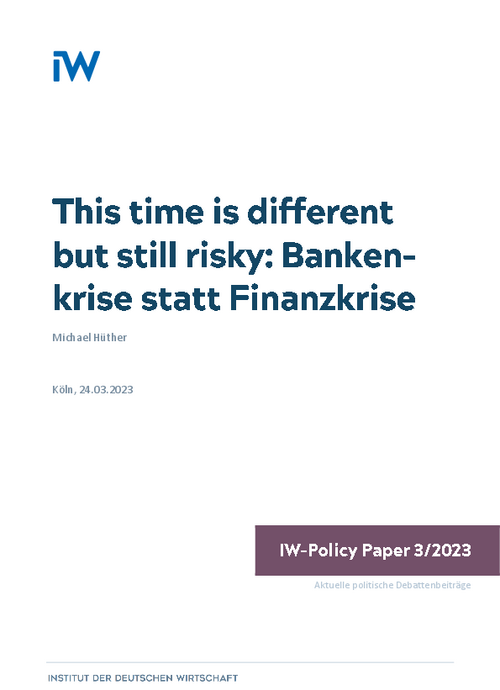The current crisis of some American and European banks inevitably triggers fears that an international banking crisis could lead to a new financial crisis. But things in 2023 are very different from those in 2007.

This time is different but still risky: Banking crisis instead of financial crisis

The current crisis of some American and European banks inevitably triggers fears that an international banking crisis could lead to a new financial crisis. But things in 2023 are very different from those in 2007.
Unlike 15 years ago, it is not the credit risk resulting from the bubble burst that is affecting the banks, but the interest rate risk, which, as a result of a previously too long phase of expansive monetary policy, has been underestimated due to the inflation component of the nominal interest rate. The rapid intervention of the central banks in the USA and Switzerland initially contributed to the stability of the international financial markets and has so far not led to a withdrawal of funds from the system, but only to shifts within the system. Nevertheless, the situation is fragile. Although there is little risk of contagion for banks in the eurozone, because the US banks affected were regional and sector-specific cases with lax regulation and Credit Suisse was already struggling, a crisis can quickly spread wider. The extremely long balance sheet of some banks can degenerate into a risk in the event of a loss of confidence until the system erodes.
Policymakers face difficult tasks, especially since the risk of a bank run remains incalculable. Regulation and supervision must have a crisis-preventive rather than a crisis-curing effect at the first symptoms. Equity capital regulation must be recalibrated. It should also be considered whether a clearly defined liability cascade including bail-in bonds could be helpful. This would increase the banks' ability to react in the event of a crisis.
The problem of too-big-to-fail needs to be addressed more strongly after the experience with Credit Suisse. It is problematic that the Resolution Plan for orderly restructuring has not taken sufficient effect and that the Swiss state, as guarantor, must once again put taxpayers' money on the line, although the legal situation would actually have required the bank to be split up. The management of Credit Suisse should be held liable for the damages incurred, otherwise there is a risk of a fatal signal effect for bank managers around the world.
It is also important for Germany that the national authorities responsible for financial market stability and bank stabilisation already pool their competences. In addition, they should be in close contact with the competent authorities at the European level in case there are contagion effects in the European banking market. Above all, the institutions should be prepared to carry out a bank stabilisation over a weekend in order to be able to shield further parts of the financial market and the real economy from the negative effects of a bank failure.

This time is different but still risky: Banking crisis instead of financial crisis

More on the topic

German Wage Policy between Inflation and Stagnation: Are Conflicts with the Aims of Monetary Policy Looming?
After the economic and financial crisis of 2008/9, the German labour market soon began to recover, creating scope for a comparatively expansive wage policy.
IW
A Macroeconomic Analysis of Wage-Price Spirals
The subject of this Analysis is the forms that wage-price spirals can take and how they influence macroeconomic stability and inflationary trends in Germany.
IW